Leveraging plural values of mangroves to mitigate climate change
The event convened over 70 on-site and 100 online participants, including global experts, government officials, and local stakeholders, to explore the multifaceted role of mangroves in environmental and community wellbeing.
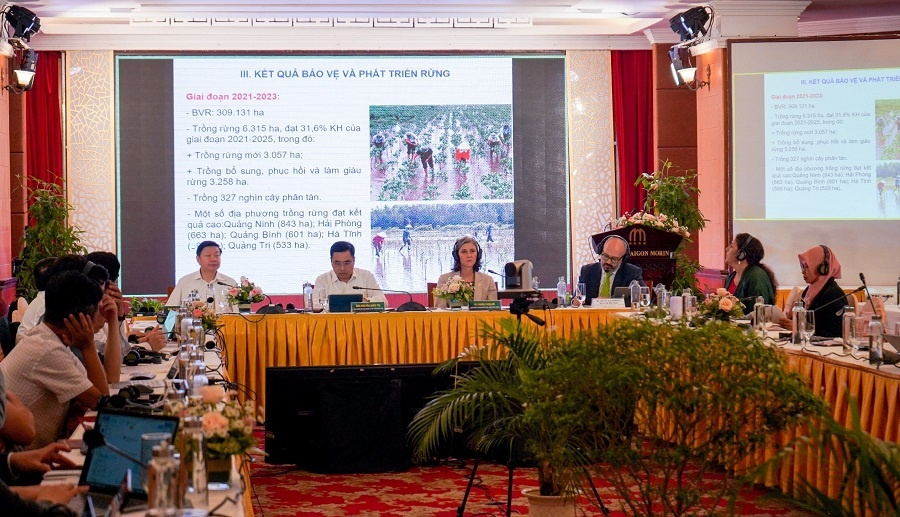 |
The workshop highlighted the roles of mangrove forests as precious resources for local communities and a significant component of blue carbon ecosystems, making them a valuable asset in the context of sustainable carbon financing and climate change mitigation.
It created an opportunity for global south countries to learn good practices and share lessons and experiences relating to mangrove forest management, protection, and development. It also focussed on the inclusion of mangroves in the nationally determined contributions (NDCs), as well as harnessing the potential of mangroves’ blue carbon to finance their protection and restoration efforts.
In his remarks, Deputy Minister of Agriculture and Rural Development Nguyen Quoc Tri emphasised the Vietnamese government’s dedication to enhancing forest management policies. He highlighted the importance of improving the effectiveness and economic value of coastal mangrove forests in the country, urging the relevant provinces to reinforce their mangrove protection and afforestation efforts.
“After this workshop, MARD will continue to direct specialised units to refine forestry policy mechanisms for governmental approval and develop technical guidelines. I urge coastal provinces to intensify their forest protection and coastal afforestation efforts,” DM Tri stated.
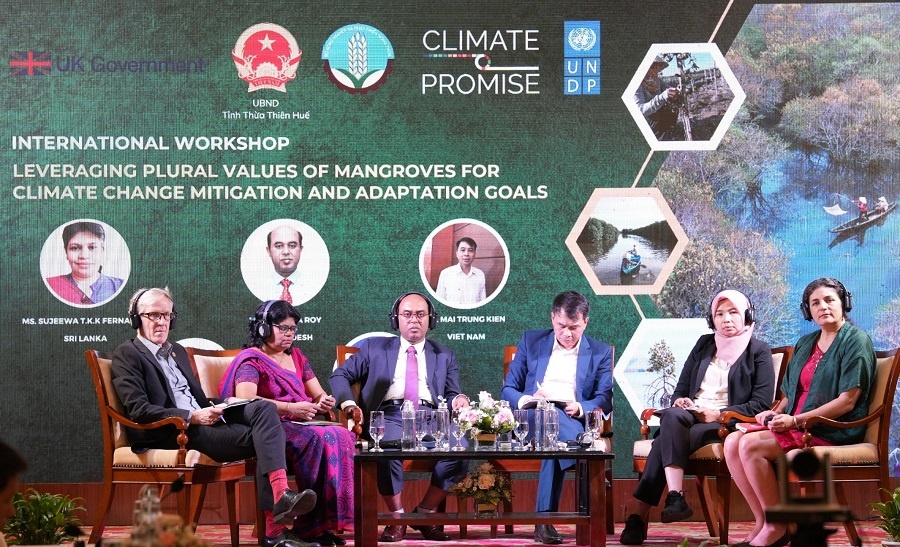 |
Ramla Khalidi, UNDP Vietnam resident representative, praised Vietnam’s leadership in terms of mangrove conservation. She highlighted collaborative projects undertaken with MARD, including the planting and rehabilitating of over 4,000 hectares of mangrove forests and an upcoming project financed by Canada to protect and generate an additional 600ha.
She also mentioned the collaboration under the UNDP’s Climate Promise, supported by the UK government, to conduct carbon stock assessments across Vietnam’s 28 coastal provinces, identify sustainable financing pathways, and understand the potential of high-integrity carbon markets under future implementation of the Paris Agreement’s Articles 6.2 and 6.4.
“The rapid loss of mangroves poses a severe threat to coastal resilience, biodiversity, and the livelihoods of the millions of people who depend on these ecosystems for sustenance. The restoration of mangroves is not merely an environmental imperative, it is a moral obligation to future generations,” Khalidi noted.
Alex White, a representative from the Department of Environment, Food and Rural Affairs in the UK said, “The UK recognises the importance of mangrove forests in addressing climate change, biodiversity loss, and sustainable development, as well as their valuable role in supporting climate-resilient and nature-positive green growth. Our collaboration with the UNDP on forests, land use, and nature focuses on understanding the benefits of these important ecosystems. It is wonderful to see examples of our joint work in Vietnam.”
Meanwhile, Vu Tan Phuong from the Vietnam Forest Certification Office (VFCO) presented the critical role of Vietnam’s forestry sector in carbon storage and emissions reduction, the forestry development strategy, and greenhouse gas mitigation measures that align with the NDCs for climate targets.
"The carbon market development plan focuses on creating a legal framework and infrastructure for carbon trading, aiming to engage the private sector in low-carbon economy development to leverage competitiveness," he said.
Experts from Sri Lanka and Indonesia also provided insights on mangrove rehabilitation initiatives in their respective countries, emphasising the urgency of preserving these vital ecosystems in the face of the global climate challenges.
Maitreyee Mukherjee, an expert from Singapore, analysed carbon markets, taxes, and emissions trading systems, highlighting their potential role in sustainable forest management and the importance of carbon credits in global environmental strategies.
"Singapore was the first ASEAN country to launch a progressive carbon tax in 2019, covering 80 per cent of national carbon emissions and providing an economy-wide price signal," said Mukherjee.
The Department of Forestry under the MARD presented a report on Vietnam’s protection and development of coastal forests 2021-2030 project, highlighting advancements in policy and technical guidelines for sustainable forest management, achievements in forest protection and afforestation, and the challenges faced, including land use issues and mangrove plantation difficulties.
The workshop concluded with a consensus on the need for both global and local actions to safeguard mangrove forests. Recognising their indispensable role in biodiversity conservation, climate change mitigation, and local economic development, participants called for enhanced cross-sectoral collaboration, sustainable financing, and the integration of mangrove conservation into national and international climate policies.
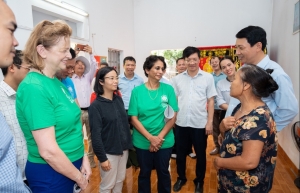 | UNDP regional director’s visit to Thanh Hoa province On the last leg of her Vietnam’s visit, UN assistant secretary-general and United Nations Development Programme ( UNDP ) regional director for Asia and the Pacific Kanni Wignaraja joined leaders and people in the north-central province of Thanh Hoa to plant mangroves as one of the most effective nature-based solutions to enhance coastal community resilience to climate change and their livelihood. |
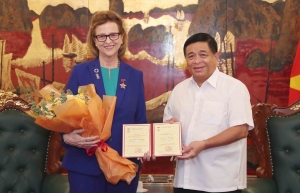 | Minister Nguyen Chi Dung hosts outgoing UNDP Resident Representative MPI- Minister Nguyen Chi Dung hosts a reception for outgoing United Nations Development Programme (UNDP) Resident Representative Caitlin Wiesen on August 30. |
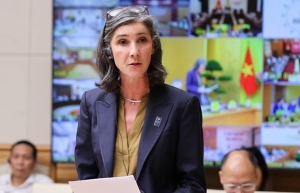 | New UNDP Resident Representative pledges support to Vietnam’s development Ramla Al Khalidi, newly-appointed UNDP Resident Representative in Vietnam, has pledged to further support Vietnam’s development, covering climate change response and the settlement of bomb and mine consequences. |
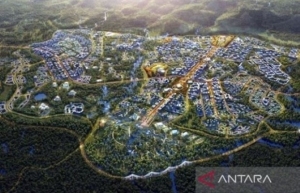 | Indonesia, UNDP cooperate to develop new capital as sustainable city Indonesia's new capital city (IKN) Nusantara Authority and the United Nations Development Program (UNDP) are collaborating to build a sustainable city in IKN Nusantara, East Kalimantan. |
What the stars mean:
★ Poor ★ ★ Promising ★★★ Good ★★★★ Very good ★★★★★ Exceptional
Related Contents
Latest News
More News
- Trung Nam-Sideros River consortium wins bid for LNG venture (January 30, 2026 | 11:16)
- Vietnam moves towards market-based fuel management with E10 rollout (January 30, 2026 | 11:10)
- Envision Energy, REE Group partner on 128MW wind projects (January 30, 2026 | 10:58)
- Vingroup consults on carbon credits for electric vehicle charging network (January 28, 2026 | 11:04)
- Bac Ai Pumped Storage Hydropower Plant to enter peak construction phase (January 27, 2026 | 08:00)
- ASEAN could scale up sustainable aviation fuel by 2050 (January 24, 2026 | 10:19)
- 64,000 hectares of sea allocated for offshore wind surveys (January 22, 2026 | 20:23)
- EVN secures financing for Quang Trach II LNG power plant (January 17, 2026 | 15:55)
- PC1 teams up with DENZAI on regional wind projects (January 16, 2026 | 21:18)
- Innovation and ESG practices drive green transition in the digital era (January 16, 2026 | 16:51)

 Tag:
Tag:




















 Mobile Version
Mobile Version